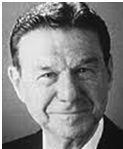|
 |
|
 |
Kaoru Ishikawa (1915-89)
A leading Japanese expert on total quality management (pictured right) - what he calls total quality control (TQC), a term borrowed from its American originator, Armand Feigenbaum (pictured right below).
Key book What Is Total Quality Control? (1985)
Wrong attitudes are the main enemy of total quality control (TQC) which is achieved by:
1. Corporate culture Total quality should be:
Everybody must accept:
2. Patience TQC will only happen if people’s attitudes are changed, but this takes time. So management must think long-term, and quick-fix solutions won’t work.
3. Teamwork
4. People policies - employees must be:
5. Quality control audits (within the organization and those inspired by external awards like the Deming Prize).
6. Specialist subcontractors and statistical quality control methods Ishikawa created the “Ishikawa diagram” (also called a “fishbone diagram”) that shows the causes of a desired result e.g. better quality.
Key quotes on quality TQC is not a miracle cure, its properties are more like that of a Chinese herb medicine. QC begins with education and ends with education. Japanese quality control is a thought revolution in management. Quality is a discipline that combines knowledge with action. Quality is everyone’s business. |
|
|
||
|
|
|
||
|
||
| Copyright © wisdomtowin.com All Rights Reserved | ||
|



